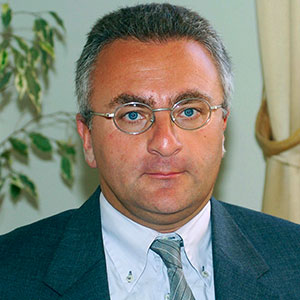Antonio Puliafito
- Università di Messina
- https://unime.it/it
10 giugno 2021 - SESSIONE 2: SMART CITIES AND COMMUNITIES
Software Defined Smart Cities: Integrating the Cyber World with the Internet of Things

Software Defined Smart Cities: Integrating the Cyber World with the Internet of Things
 Antonio Puliafito is a full professor of computer engineering at the University of Messina, Italy. His interests include parallel and distributed systems, networking, IoT, Cloud computing, advanced analytical modeling techniques. He regularly acts as a referee for the European Community since 1998. He contributed to the development of the software tools WebSPN, ArgoPerformance and Stack4Things. He co-authored the text entitled "Performance and Reliability Analysis of Computer Systems", edited by Kluwer.
Antonio Puliafito is a full professor of computer engineering at the University of Messina, Italy. His interests include parallel and distributed systems, networking, IoT, Cloud computing, advanced analytical modeling techniques. He regularly acts as a referee for the European Community since 1998. He contributed to the development of the software tools WebSPN, ArgoPerformance and Stack4Things. He co-authored the text entitled "Performance and Reliability Analysis of Computer Systems", edited by Kluwer.
He leads the Center for Information Technologies at University of Messina (CIAM). From 2006 to 2008 he acted as the technical director of the Project 901, winner of the CISCO innovation award. He actively contributed to the success of the TriGrid VL and PI2S2 projects. He has been working in several EU funded projects such as: Reservoir, Vision Cloud, CloudWave, Beacon, Frontier Cities. He was also the main investigator of the Italian PRIN2008 research project Cloud@Home, to combine cloud and volunteer computing. He acted as scientific coordinator of the PON 2007-2013 SIGMA project on using cloud computing to manage severe risk phenomena.
He is coordinating the #SmartME crowdfunding initiative to develop a smart city framework in the city of Messina. He is the co-founder of SmatMe.io, a startup working on the integration of cloud and IoT in smart cities contexts. He leads the Toolsmart project to enhance re-using of smart city solutions in the cities of Turin, Padua, Lecce and Syracuse. He is the Director of the Lab on Smart Cities & Communities of the Italian Consortium on Informatics (CINI)
ABSTRACT
 A smart city represents an improvement of today’s cities both functionally and structurally, that strategically utilizes many smart factors, such as information and communications technology (ICT), to increase the city’s sustainable growth and strengthen city functions, while ensuring citizens’ quality of life and health. Cities can be viewed as a microcosm of “objects” with which citizens interact daily: street furniture, public buildings, transportation, monuments, public lighting and much more. Moreover, a continuous monitoring of a city’s status occurs through sensors and processors applied within the real-world infrastructure. The Internet of Things (IoT) concept imagines all these objects being “smart”, connected to the Internet, and able to communicate with each other and with the external environment, interacting and sharing data and information. Each object in the IoT can be both the collector and distributor of information regarding mobility, energy consumption, air pollution as well as potentially offering cultural and tourist information. As a consequence, cyber and real worlds are strongly linked in a smart city. New services can be deployed when needed and evaluation mechanisms will be set up to assess the health and success of a smart city. This talk will present some innovative developments in areas related to sensors and smart cities, introduce the crowdfunding #SmartME initiative and present the ToolSmart smart cities project in the cities of Turin, Padoa, Lecce and Syracuse
A smart city represents an improvement of today’s cities both functionally and structurally, that strategically utilizes many smart factors, such as information and communications technology (ICT), to increase the city’s sustainable growth and strengthen city functions, while ensuring citizens’ quality of life and health. Cities can be viewed as a microcosm of “objects” with which citizens interact daily: street furniture, public buildings, transportation, monuments, public lighting and much more. Moreover, a continuous monitoring of a city’s status occurs through sensors and processors applied within the real-world infrastructure. The Internet of Things (IoT) concept imagines all these objects being “smart”, connected to the Internet, and able to communicate with each other and with the external environment, interacting and sharing data and information. Each object in the IoT can be both the collector and distributor of information regarding mobility, energy consumption, air pollution as well as potentially offering cultural and tourist information. As a consequence, cyber and real worlds are strongly linked in a smart city. New services can be deployed when needed and evaluation mechanisms will be set up to assess the health and success of a smart city. This talk will present some innovative developments in areas related to sensors and smart cities, introduce the crowdfunding #SmartME initiative and present the ToolSmart smart cities project in the cities of Turin, Padoa, Lecce and Syracuse



